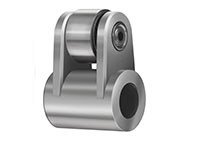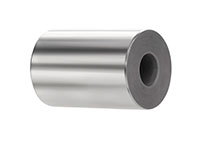Certifications
ISO 9001:2015
IATF 16949:2016
ISO 14001:2015
ISO 45001:2018
REACH COMPLIANT
ELV COMPLIANT
NRB Bearings Limited (NRB) has entered into a Joint
Venture Agreement with Unitec S.r.L. (a company
incorporated under the laws of Italy and part of the
Mondial group) and Mondial S.p.A.
Read More
Needle bush bearings consist of a thin, heat treated outer ring formed from accurately controlled sheet steel encasing a set of needles.
Read More
A crankpin is the part of the crank of a crankshaft to which the connecting rod is attached. Crankpins transfer up-and-down motion between the crankshaft and connecting rod.
Read More
Needle roller bearings are categorized into the following two groups: • Needle roller and cage assembly bearings
• Full-complement needle roller bearings
Read More
Drawn cup needle roller bearings typically consist of three types of components. The first is a “cup”, which is formed from flat sheet stock via metal stamping and forming operations into a housing which functions as an outer race.
Read More
Tapered roller bearings consist of four basic components including the cone (inner ring), the cup (outer ring), tapered rollers, and a cage (roller retainer). The cone, cup, and rollers carry the load while the cage spaces and retains the rollers on the cone. The cone, rollers and cage components of tapered roller bearings are referred to as the cone assembly.
Read More
Drawn cup needle roller bearing is composed of an outer ring drawn from a thin steel plate by precision drawing, needle rollers and a cage assembled in the outer ring after the raceway surface thereof was hardened. Of the bearings with the outer ring, this bearing type is a bearing with the smallest section height which enables space-saving and cost-saving.
Read More
Thrust Needle Roller Bearings consist of a precisely made cage and rollers. They have high rigidity and high load capacities and can be used in small spaces. Thrust Needle Roller Bearings incorporate needle rollers, while Thrust Roller Bearings incorporate cylindrical rollers.
Read More
Ball Bearings are a type of rolling-element bearing that uses balls to maintain the separation between the moving parts of the bearing. The purpose of a ball bearing is to reduce rotational friction and support radial and axial loads.
Read More
Needle roller thrust bearings are fitted with a form-stable cage to reliably retain and guide a large number of needle rollers. Needle roller thrust bearings provide a high degree of stiffness within a minimum axial space.
Read More
Roller bearings are the earliest known type of rolling-element-bearing, dating back to at least 40 BC. Common roller bearings use cylinders of slightly greater length than diameter. Roller bearings typically have higher radial load capacity than ball bearings, but a lower capacity and higher friction under axial loads.
Read More
A needle roller bearing is a bearing that uses small cylindrical rollers. These rollers are used to reduce friction of a rotating surface. Compared with ball bearings, needle roller bearings have a large surface area that is in contact with the bearing raceway journals.
Read More
All moving parts of automobiles require bearings to function. Bearings enhance the performance of the vehicles, bear heavy loads, and reduce friction. Some major sub-systems where bearings are used are engines, gearboxes, transmissions, wheels, steering, electrical motors, pumps etc.
Read More
NRB offers a precision engineered range of drawn cup needle roller bearings to various clients. These are a kind of roller bearings with cylindrical rollers that are long and thin in relation to their diameter.
Read More

Rocker arms were first invented in the 19th century and have changed little in function since then. Improvements have been made, however, in both efficiencies of operation and construction materials
Read More

A crankpin or crank journal is a journal in an engine or mechanical device. That is, the part of a shaft or axle that rests on bearings
Read More

Cylindrical roller bearings are bearings in which cylinders are used as the rolling components as opposed to balls in ball bearings. Because of this, the rollers have a greater (linear)...
Read More

Tapered roller bearings are rolling component bearings that can support axial forces as well as radial forces.
A Key feature of Tapered Roller Bearing is ability to handle high combined axial and radial loads...
Read More

Needle roller bearings have relatively small diameter cylindrical rolling elements whose length is much larger than their diameter. Compared with other types of rolling bearings, needle roller...
Read More

Full complement needle bearings have a through a hardened outer ring which results in high static and dynamic load capacities and an ability to withstand overloading, shocks, and vibration.
Read More

A ball bearing is a rolling element that uses balls to maintain the separation between the bearing races. Ball bearings support rotary parts and reduce friction to facilitate the smooth operation of machines.
Read More